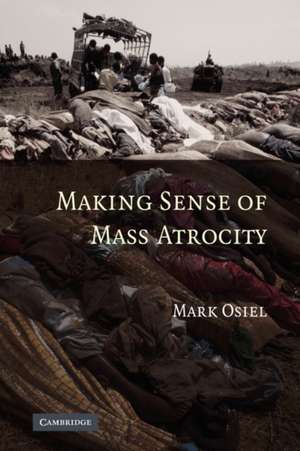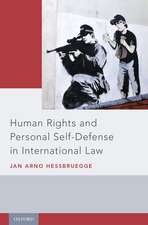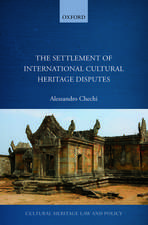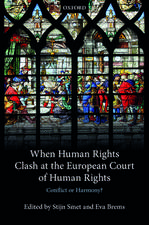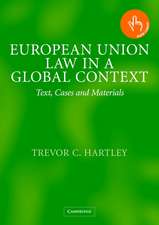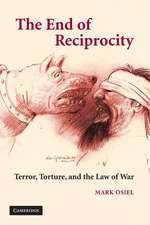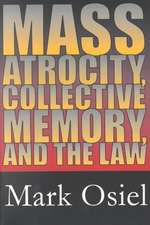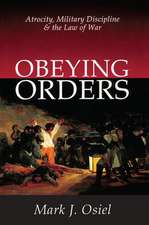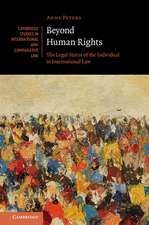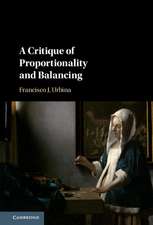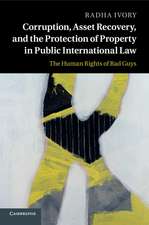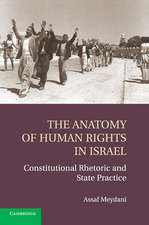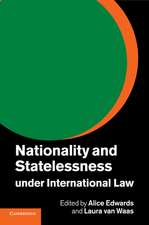Making Sense of Mass Atrocity
Autor Mark Osielen Limba Engleză Paperback – 17 aug 2011
| Toate formatele și edițiile | Preț | Express |
|---|---|---|
| Paperback (1) | 334.57 lei 6-8 săpt. | |
| Cambridge University Press – 17 aug 2011 | 334.57 lei 6-8 săpt. | |
| Hardback (1) | 473.47 lei 6-8 săpt. | |
| Cambridge University Press – 30 iul 2009 | 473.47 lei 6-8 săpt. |
Preț: 334.57 lei
Nou
Puncte Express: 502
Preț estimativ în valută:
64.04€ • 69.59$ • 53.83£
64.04€ • 69.59$ • 53.83£
Carte tipărită la comandă
Livrare economică 21 aprilie-05 mai
Preluare comenzi: 021 569.72.76
Specificații
ISBN-13: 9781107403185
ISBN-10: 1107403189
Pagini: 276
Dimensiuni: 152 x 229 x 15 mm
Greutate: 0.37 kg
Editura: Cambridge University Press
Colecția Cambridge University Press
Locul publicării:New York, United States
ISBN-10: 1107403189
Pagini: 276
Dimensiuni: 152 x 229 x 15 mm
Greutate: 0.37 kg
Editura: Cambridge University Press
Colecția Cambridge University Press
Locul publicării:New York, United States
Cuprins
1. The challenge of prosecuting mass atrocity; Part I. Legal Rules and their Problems: 2. The responsibility of superiors; 3. Participating in a criminal enterprise; 4. Defining the criminal enterprise; Part II. The Political Context of Legal Choice: 5. Must national prosecutions serve global concerns?; 6. The conflicting incentives of national and international prosecutors; Part III. New Possibilities and Solutions: 7. The bureaucracy of murder; 8. Collective sanctions for collective wrong; 9. The collective responsibility of military officers; 10. Being economical with amnesty.
Recenzii
Review of the hardback: 'The law's confrontation with mass evil is the urgent focus of Mark Osiel's engrossing, compelling, and wholly original book. Ranging from Dachau to Darfur, Cambodia and South America to the former Yugoslavia, Osiel weaves together deep understanding of how violence becomes organized, the cloudy relationships between leaders and others, the role of emerging networks of violence, and the law's difficulties in coming to grips with assigning responsibility for mass evil. Academically original, yet written in a lively, accessible voice, this book is essential reading on one of the central moral, political, and legal struggles of our time.' Richard H. Pildes, Sudler Family Professor of Constitutional Law, Co-Director, NYU Center on Law and Security, NYU School of Law
Review of the hardback: 'This focus of this book is on two central questions: how does mass atrocity happen and how should the criminal law respond. By addressing them not only from a legal perspective, but also drawing from a vast literature outside the law … Mark Osiel engages the reader into a much needed 'thinking outside the box' exercise, inviting international criminal lawyers to leave the 'professorial echo chamber' and to have a fresh look at the social realities of mass atrocity and the legal theories that try to capture it. The result is a refreshing analysis of these theories as they emerge from the jurisprudence of the ad hoc tribunals and the ICC … Osiel paints a fascinating picture of the political context in which legal choices between these theories are made, exploring the conflicting incentives of international and national prosecutors in post-conflict societies and explaining why national and international courts often treat similarly situated offenders differently. He offers some interesting new possibilities and solutions, and suggests ways to overcome bystander indifference in situations where mass atrocities occur … invaluable reading …' Christine Van den Wyngaert, Judge, International Criminal Court
Review of the hardback: 'Mark Osiel continues his unique blend of close legal reasoning, a profound sense of the worst potentials lurking in human nature, and a deep appreciation of the practical … At the root of the work is a deeply moral motive – to find effective means of restraining and punishing the worst kinds of atrocities. What most distinguishes Osiel's contribution is his avoidance of legal or moral idealism. Exploring the scope and limits of the law's power over such behavior, Osiel offers sage, judicious, balanced, and realistic proposals for finding our way toward a more law-governed international community.' Martin L. Cook, Admiral James Bon Stockdale Chair of Professional Military Ethics, U.S. Naval War College
Review of the hardback: 'In this provocative, seminal work, Professor Osiel masterfully explores innovative legal vehicles to justly hold accountable individual and group perpetrators of mass atrocity … He brings to bear ground-breaking, and in some cases, somewhat controversial legal theories and tactics to attach proper criminal liability to those culpable in mass killings. A bold, highly instructive, and invaluable contribution to transnational humanitarian law.' Colonel Joseph P. 'Dutch' Bialke, U.S. Air Force Judge Advocate
Review of the hardback: 'This focus of this book is on two central questions: how does mass atrocity happen and how should the criminal law respond. By addressing them not only from a legal perspective, but also drawing from a vast literature outside the law … Mark Osiel engages the reader into a much needed 'thinking outside the box' exercise, inviting international criminal lawyers to leave the 'professorial echo chamber' and to have a fresh look at the social realities of mass atrocity and the legal theories that try to capture it. The result is a refreshing analysis of these theories as they emerge from the jurisprudence of the ad hoc tribunals and the ICC … Osiel paints a fascinating picture of the political context in which legal choices between these theories are made, exploring the conflicting incentives of international and national prosecutors in post-conflict societies and explaining why national and international courts often treat similarly situated offenders differently. He offers some interesting new possibilities and solutions, and suggests ways to overcome bystander indifference in situations where mass atrocities occur … invaluable reading …' Christine Van den Wyngaert, Judge, International Criminal Court
Review of the hardback: 'Mark Osiel continues his unique blend of close legal reasoning, a profound sense of the worst potentials lurking in human nature, and a deep appreciation of the practical … At the root of the work is a deeply moral motive – to find effective means of restraining and punishing the worst kinds of atrocities. What most distinguishes Osiel's contribution is his avoidance of legal or moral idealism. Exploring the scope and limits of the law's power over such behavior, Osiel offers sage, judicious, balanced, and realistic proposals for finding our way toward a more law-governed international community.' Martin L. Cook, Admiral James Bon Stockdale Chair of Professional Military Ethics, U.S. Naval War College
Review of the hardback: 'In this provocative, seminal work, Professor Osiel masterfully explores innovative legal vehicles to justly hold accountable individual and group perpetrators of mass atrocity … He brings to bear ground-breaking, and in some cases, somewhat controversial legal theories and tactics to attach proper criminal liability to those culpable in mass killings. A bold, highly instructive, and invaluable contribution to transnational humanitarian law.' Colonel Joseph P. 'Dutch' Bialke, U.S. Air Force Judge Advocate
Descriere
This book trenchantly diagnoses the law's limits in making sense of mass atrocity.
